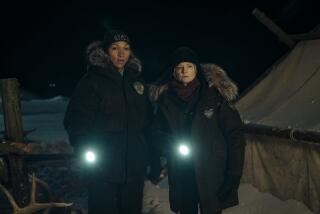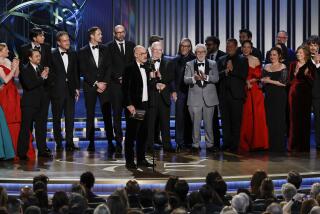‘Homeland’ adjusts in Season 3 after last year’s explosions
WASHINGTON, D.C. — Early in the new season of “Homeland,” which premieres Sunday on Showtime, Saul Berenson sits with a tumbler of whiskey in his hand and a defeated look on his face.
“I’m not temperamentally suited to the job,” says the veteran intelligence officer played by Mandy Patinkin, who finds himself ill at ease in his new role as acting director of the CIA.
Alex Gansa, “Homeland’s” creator, show runner and — in the wake of a Season 2 backlash that saw critics reject the Emmy-winning terrorism drama as emphatically as they’d once embraced it — most public defender, knows the feeling all too well.
PHOTOS: Hollywood Backlot moments
“I so relate to Saul,” he says at D.C.’s tony Hay-Adams Hotel.
Unlike some other TV creators of his caliber, Gansa, formerly a producer on “Entourage” and “24,” does not summarily dismiss the criticisms leveled at his show. Instead, he speaks with a disarming level of candor about the challenges of overseeing such an intensely scrutinized program.
Co-created by Howard Gordon and loosely based on the Israeli drama “Hatufim,” “Homeland” was anointed TV’s Next Great Show when it premiered in 2011. Viewers and critics alike were captivated by the strange romance between brilliant but bipolar CIA agent Carrie Mathison and Marine-turned-terrorist Nicholas Brody. “Homeland” swept last year’s Emmys, where it was named outstanding drama series and leads Damian Lewis and Claire Danes won their respective categories.
As Showtime’s highest-rated freshman series, “Homeland” represented a thorough creative and commercial triumph for the network, one which finally enabled it to chip away at HBO’s decades-old dominance in the prestige-TV game.
PHOTOS: Leading ladies of the fall TV season
Then came the second season.
In its sophomore outing, “Homeland” essentially reversed the narrative trajectory of the first season. Brody, a freshly elected congressman, rejects his jihadist beliefs and aligns with the CIA, only to be framed as the mastermind of a surprise attack on agency headquarters. The pole shift required some extravagant plot twists — including, perhaps most infamously, an assassination carried out via a hacked pacemaker.
Critics hammered the “Homeland” writing staff over the supposed lapses in plausibility. Buzzfeed’s Kate Aurthur called the season “meandering, maddening, and unintentionally funny,” while Salon’s Willa Paskin settled on “crazy, bananas, bonkers, idiotic, insane, stupid, contrived, deranged.”
Yet as the backlash grew to a fever pitch, so did the ratings. An average of 6.2 million viewers tuned in across various platforms last year, representing a 43% increase over Season 1. Surely not all of them were hate-watching.
Danes, who took her second Emmy for the role Sept. 22, is unfazed by the uproar. “A second effort is always going to be held to task much more rigorously,” she says via telephone from Charlotte, N.C., where the series is filmed. “I think people’s expectations were incredibly high.”
But Gansa is not so blithe. “I feel exactly the same way about the acclaim of Season 1 that I feel about the backlash of Season 2 and that is some of it was deserved and some of it wasn’t,” he says, having just returned from a private tour of the (still very much intact) CIA headquarters in Langley, Va.
Later that evening, he’ll attend a splashy premiere party at the Corcoran Gallery of Art attended by, among others, Rep. Henry Waxman of Los Angeles, New York Times columnist Maureen Dowd and “Face the Nation” host Bob Schieffer. Even on a day when the nation teeters on the brink of intervention in Syria, Washington’s elite are eager to bask in the “Homeland” limelight — evidence, perhaps, that the show has yet to truly jump the shark.
Although Gansa is willing to concede that Season 2 had its “wobbly moments” (for the record, he thinks the season’s weakest episode was “A Gettysburg Address”), he remains wary of recap culture. “It’s hard to take every episode and analyze it on its own merits, because it’s a chapter in an ongoing story,” he says. “The way these shows are picked apart and analyzed now is so crazy.”
PHOTOS: Celebrities by The Times
What some of the naysayers also seem to have forgotten — or conveniently ignored — is that from the outset, the show required viewers to suspend a generous amount of disbelief, as Gansa readily admits: “Start with the premise: a bipolar CIA agent and a Marine who’s been turned in captivity. I mean those are fairly implausible ideas to begin with, but they’re dramatic.”
The backlash was also in a perverse way hugely flattering; after all, it meant viewers were passionate about the material. “It’s a bit like soccer fans at home,” says Lewis, a Brit. “If your manager makes a bad call during a match or a player leaves, they feel betrayal keenly, and TV fans are the same way.”
But the real problem, Lewis suggests, was him — or rather, his character, Brody. “I think they’re dying to get rid of me,” he whispers. “I feel like I’m on a constant stay of execution.”
The Brody issue
“Dying” might be a touch hyperbolic, but Brody’s continued presence has created a major problem for the “Homeland” writing staff.
Initially, the Brody-Carrie relationship was not supposed to be so central to the narrative. But thanks largely to the so-crazy-it-works connection between these wounded souls, Brody has evaded death at the hand of the writing staff not once but twice: first in the thwarted suicide mission at the end of Season 1 and again somewhere in the middle of Season 2.
According to Lewis, “Homeland” got “a bit roller coaster-y” last year because the writers originally planned to kill him off before the finale. After conversations with executives at Showtime, who were eager to keep everyone’s favorite redheaded terrorist alive, they scrapped Plan A and were forced to improvise some “major narrative leaps” for the Langley conflagration to play out as intended.
“I think they’ve had to compromise a bit, ironically, because the show became successful,” he says.
It could be that what some “Homeland” viewers objected to about Season 2 was that it laid bare the messy process of creating a television series, which is as much about serendipity as sweeping creative vision. In an era when shows are pored over like great literature, it’s easy to forget these grand narratives are not pre-determined but formed by a committee of writers.
As Gansa puts it, “You are making so many decisions along the way, any of which can bury you.”
Though he corroborates Lewis’ version of events, Gansa says he was delighted with the outcome — backlash and all. Nor does he resent the pressure to keep Brody alive. “Showtime is the best partner on the planet. Part of the reason why they’re great is they have very strong opinions.”
Showtime Entertainment President David Nevins acknowledges there were discussions about Brody’s fate but insists the decision was ultimately in Gansa’s hands. “He knows he’s got the latitude to do what he thinks the storytelling dictates. If the writers had really wanted to kill Brody off, he would be dead.”
But even if Lewis is “the most charming human being on the planet,” as Gansa describes the actor, he warns that Brody is expendable, as is nearly every other character. As if to prove the point, Gansa and his team have delayed Brody’s reappearance in Season 3. “His story will end one way or another when his presence on the show stops bearing fruit,” Gansa says. “I will say that I think we’ve traveled a lot of the emotional landscape between these two characters in these first two seasons.”
And that’s just fine with Lewis. “If all Brody becomes is a love interest for Carrie, then he’ll become dull very quickly.”
In a corner
Gansa and his staff didn’t have much time to lick their wounds after Season 2. Taking just a two-week break, they got back to work the day after the Golden Globes in January, where “Homeland” dominated the awards for the second year in a row.
ON LOCATION: Where the cameras roll
“We were worrying about Season 3 from the minute we conceived of the finale of Season 2. We did not even have that little tiny building block,” he recalls. “The narrative strategy that we employ in the writers room is how tight a corner can we paint ourselves into and then how can we wriggle out of it.”
Making the task more difficult was the absence of executive producer Meredith Stiehm, who left to run “The Bridge” on FX (but will return to write the Season 3 finale). Then in March, executive producer Henry Bromell died of a heart attack. (He was awarded a posthumous Emmy Sept. 22 for writing the riveting “Q&A”; the last episode he scripted, “Tower of David,” will air this season.)
“My own analysis is that we are all sad too, in the writers’ room, having lost Henry,” Gansa says. “I think it infused the storytelling.”
The influence of other real-world tragedies is evident in the season ahead. With Brody suddenly the most wanted man in the world, his family grapples with its newfound infamy. In particular, his teenage daughter, Dana, acts out in self-destructive ways straight out of the Carrie Mathison playbook. Says Morena Baccarin, who stars as Brody’s estranged wife, Jessica, “I don’t know how much more they can go through.”
The Boston Marathon bombing and the massacre at Sandy Hook Elementary School inspired the Brodys’ predicament. And just as the writers’ room was reconvening in January, then-Secretary of State Hillary Rodham Clinton testified before the Senate Foreign Relations Committee about the 2012 attack on the U.S. diplomatic mission in Benghazi, Libya.
This showdown is echoed in the fictional world of “Homeland”: After the Langley bombing, the decimated CIA is subject to a congressional inquiry, and Carrie, once again off her medication, makes an easy scapegoat for grandstanding politicians.
“Carrie feels profound guilt about not being able to thwart the bombing. She feels hugely personally responsible,” Danes says. “She believes that if she had not been medicated her mind would have been sharp enough to have foreseen the attacks.”
Making matters worse, she’s also at odds with her mentor and father figure, Saul, who struggles with his grave new set of responsibilities. While many viewers will be delighted to see Patinkin get more screen time, they are less likely to be thrilled about the rift between Saul and Carrie. But not to worry: The actor, in his typically lyrical fashion, hints that the alienation is only temporary.
“You were a child and I would guess that your parents had occasionally reached frustration with you on occasion at least once,” he says.
The prevailing theme of the new season is, according to Gansa, the cost of being an intelligence officer. Patinkin puts it a slightly different way: “the result that occurs from the marrying of politics and the human heart.”
For better or for worse, it’s quite a departure from Season 2. “With most shows I’m pushing to shake it up,” says Nevins. “With this show Alex goes there instinctively and he’s allergic to a sense of repetition. He really doesn’t want to walk the same territory twice.”
Looking ahead to Season 4 (all but guaranteed at this point, unless Claire Danes enters the witness protection program), Gansa is excited to upend the formula even more. During his visit to the CIA, he asked for suggestions about where to set story lines; agents steered him toward North Africa as a fertile hotbed for counter-terrorism efforts.
So could this mean Carrie and her conspiracy corkboard will be relocating to Timbuktu?
It’s a possibility — Gansa points to the example of “The Wire,” which really “re-invented itself every year.” “I think going forward, that will be more the ‘Homeland’ model,” he says.
The only certainty? Carrie is here to stay.
“C’mon,” Gansa says, smiling. “That’s the franchise.”
More to Read
The complete guide to home viewing
Get Screen Gab for everything about the TV shows and streaming movies everyone’s talking about.
You may occasionally receive promotional content from the Los Angeles Times.






